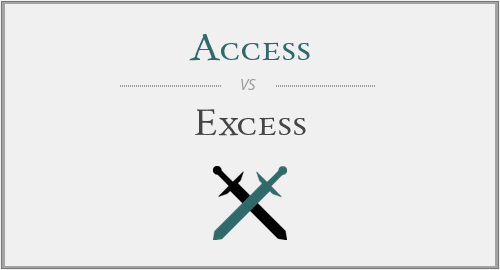Access” and “excess” are often confused due to their spelling similarities. But these words have completely different meanings and must never be used one instead of the other.
We have prepared a complete explanation for the meanings of these words, so that English users can clearly understand the differences between “access” and “excess” and when/how they should be used in a message. Check the examples below to get the best understanding of these concepts.
Access vs. Excess
Besides their different meanings, “access” and “excess” also have different functions in sentences. “Access” functions as a noun and as a verb, while “excess” is used as a noun and as an adjective. Despite the fact that they are spelled quite alike, “access” and “excess” appear in so different contexts that misspelling/confusing them will certainly create an error in your message.
When do we use “access”?
“Access”, as a noun, defines the right or opportunity to use or see something. Secondly, it can also define the way that can be used to get to a place or to enter it. In addition, “access” can also function as a verb. In this case, it defines the action of finding or seeing information, usually when using a computer, a laptop or other kind of smart electronic device.
Example 1: I don’t have access to their database or information. – “access”, as a noun, can define the right to see certain information.
Example 2: They blocked our access to the town. – “access” can also be used as a noun to define the way to enter a place.
Example 3: You have to access your account in order to modify your order. – “access”, used as a verb, defines the action of using a computer to find, connect or modify some information.
When do we use “excess”?
As a noun, “excess” is used when referring to something “extra”, something more than usual or needed. As an adjective, it keeps the same signification, describing something that is “extra”.
Example 1: A slight excess of resources on the market has caused prices to lower a little. – when used as a noun, “excess” defines a quantity that is more than usual.
Example 2: You’ll have to pay quite a lot for your excess luggage. – when used as an adjective, “excess” is a synonym for “extra”.
Conclusion
Both “access” and “excess” have complex explanations, but they never actually refer to the same things. To keep it short, the first is related to information, to the opportunity to see, obtain, enter, connect or use something, while the letter refers to something that is too much, something “extra”. Even though these words have similar spellings, make sure you remember their meanings before using them in your messages, so that you don’t confuse or misspell them and confuse your audience.









Have a discussion about this article with the community:
Report Comment
We're doing our best to make sure our content is useful, accurate and safe.
If by any chance you spot an inappropriate comment while navigating through our website please use this form to let us know, and we'll take care of it shortly.
Attachment
You need to be logged in to favorite.
Log In